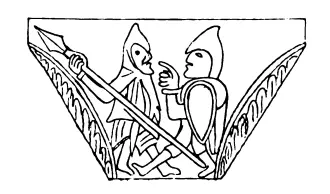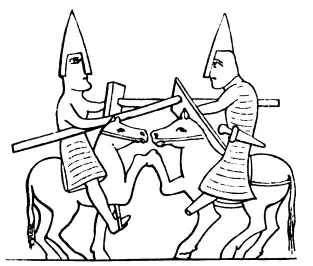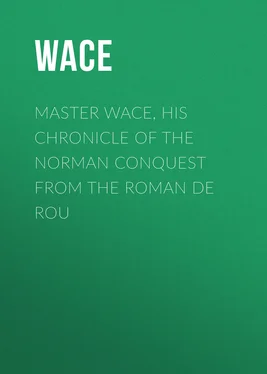Wace - Master Wace, His Chronicle of the Norman Conquest From the Roman De Rou
Здесь есть возможность читать онлайн «Wace - Master Wace, His Chronicle of the Norman Conquest From the Roman De Rou» — ознакомительный отрывок электронной книги совершенно бесплатно, а после прочтения отрывка купить полную версию. В некоторых случаях можно слушать аудио, скачать через торрент в формате fb2 и присутствует краткое содержание. Жанр: foreign_prose, История, foreign_edu, foreign_antique, на английском языке. Описание произведения, (предисловие) а так же отзывы посетителей доступны на портале библиотеки ЛибКат.
- Название:Master Wace, His Chronicle of the Norman Conquest From the Roman De Rou
- Автор:
- Жанр:
- Год:неизвестен
- ISBN:нет данных
- Рейтинг книги:4 / 5. Голосов: 1
-
Избранное:Добавить в избранное
- Отзывы:
-
Ваша оценка:
- 80
- 1
- 2
- 3
- 4
- 5
Master Wace, His Chronicle of the Norman Conquest From the Roman De Rou: краткое содержание, описание и аннотация
Предлагаем к чтению аннотацию, описание, краткое содержание или предисловие (зависит от того, что написал сам автор книги «Master Wace, His Chronicle of the Norman Conquest From the Roman De Rou»). Если вы не нашли необходимую информацию о книге — напишите в комментариях, мы постараемся отыскать её.
Master Wace, His Chronicle of the Norman Conquest From the Roman De Rou — читать онлайн ознакомительный отрывок
Ниже представлен текст книги, разбитый по страницам. Система сохранения места последней прочитанной страницы, позволяет с удобством читать онлайн бесплатно книгу «Master Wace, His Chronicle of the Norman Conquest From the Roman De Rou», без необходимости каждый раз заново искать на чём Вы остановились. Поставьте закладку, и сможете в любой момент перейти на страницу, на которой закончили чтение.
Интервал:
Закладка:
The story of the Normans is long and hard to put into romanz. If any one ask who it is that tells it and writes this history, let him know that I am Wace, of the isle of Jersey, which is in the western sea, appendant to the fief of Normandy. I was born in the island of Jersey, but was taken to Caen when young; and, being there taught, went afterwards to France, where I remained for a long time. When I returned thence, I dwelt long at Caen, and there turned myself to making romances, of which I wrote many.
In former times, they who wrote gests and histories of other days used to be beloved, and much prized and honoured. They had rich gifts from the barons and noble ladies; but now I may ponder long, and write and translate books, and may make many a romance and sirvente, ere I find any one, how courteous soever he may be, who will do me any honour, or give me enough even to pay a scribe. I talk to rich men who have rents and money; it is for them that the book is made, that the tale well told and written down; but noblesse now is dead, and largesse hath perished with it 5 5 These laments are frequent in the minstrels' songs of that age in all countries. Walther von der Vogelweide, the German minnesinger, by for the most varied and interesting poet of his day, is often very plaintive in his lamentations; 'Hie vor do was diu welt so schöne, Nu ist si worden also höne,' The world was once so beautiful, And now so desolate and dull.' See notice of his life and works in Lays of the Minnesingers, London, 1825. At the conclusion of his Chronicle, Wace mentions Maistre Beneit (de Sainte-More) as commissioned to undertake a similar task, and expresses himself by no means satisfied with his patron, Henry II. Mult me duna, plus me pramist: E se il tot duné m'eust Ço k'il me pramist, mielx me fut.
; so that I have found none, let me travel where I will, who will bestow ought upon me, save king Henry the second. He gave me, so God reward him, a prebend at Bayeux 6 6 The names and values of the forty-nine prebends of Bayeux appear in the Mémoires des Antiq. Norm . viii. 458-467. Seven of them were created by Bishop Odo, out of the forfeited lands of Grimoult du Plessis after mentioned.
, and many other good gifts. He was grandson of the first king Henry, and father of the third 7 7 These three Henrys were Henry I. and Henry II. of England, and Henry the latter's son, who died in 1182, in his father's lifetime, but was living when Wace wrote. He was expectant heir of England and Normandy, and was then in the possession or government of the latter, so as in some measure to justify Wace's epithets.
. Three kings—dukes and kings—dukes of Normandy, and kings of England—all three have I known, being a reading clerk, in their days.
In honour of the second Henry, of the line of Roul, I have told the tale of Roul, of his noble parentage, of Normandy that he conquered, and the prowess that he showed. I have recounted the history of William Lunge-espee, till the Flemings killed him by felony and treason; of Richard his son, whom he left a child; [of the second Richard, who succeeded him; of his son the third Richard; who was soon followed by Duke Robert his brother, who went to Jerusalem, and died by poison; and now the tale will be of William his son, who was born to him of the 'meschine, Arlot of Faleise'] 8 8 Roul is of course the personage usually called Rollo. The sentence in brackets comprises a few words, added by the translator; condensing the intervening part of the Chronicle, so as to introduce that portion of the work which he proceeds to translate.
.


CHAPTER I.
HOW WILLIAM BECAME DUKE, AND HOW HIS BARONS REVOLTED AGAINST HIM
The mourning for Duke Robert was great and lasted long; and William his son, who was yet very young, sorrowed much. The feuds against him were many, and his friends few; for he found that most were ill inclined towards him; those even whom his father held dear he found haughty and evil disposed. The barons warred upon each other; the strong oppressed the weak; and he could not prevent it, for he could not do justice upon them all. So they burned and pillaged the villages, and robbed and plundered the villains, injuring them in many ways.
A mighty feud broke out between Walkelin de Ferrieres 9 9 This combat is mentioned by William of Jumieges. Vauquelin or Vauclin is a name still common in Normandy. See as to Ferrieres Mémoires des Antiq, Norm . iv. 434. Vauquelin de Ferrieres left two sons, William and Henry, who distinguished themselves at the conquest, and were liberally rewarded. We shall find the name hereafter.
, and Hugh Lord of Montfort 10 10 The Montforts will be noticed afterwards.
; I know not which was right and which wrong; but they waged fierce war with each other, and were not to be reconciled; neither by bishop nor lord could peace or love be established between them. Both were good knights, bold and brave. Once upon a time they met, and the rage of each against the other was so great that they fought to the death. I know not which carried himself most gallantly, or who fell the first, but the issue of the affray was that Hugh was slain, and Walkelin fell also; both lost their lives in the same affray, and on the same day.
William meantime grew, and strengthened himself as his years advanced; yet still he was forced to hear and see many a deed which went against his heart, though he could do nothing to prevent it The barons' feuds continued; they had no regard for him. Every one according to his means made castles and fortresses. On account of the castles wars arose, and destruction of the lands; great affrays and jealousies; maraudings and challengings; while the duke could give no redress 11 11 See as to this state of anarchy William of Jumieges, and Ordericus Vitalis . We pass over a portion of the Chronicle, as to the French king's demand of the destruction of Tillieres, and Gilbert Crespin's defence of it, and other disputes with the king.
to those who suffered such wrongs.
Still as he advanced in age and stature he waxed strong; for he was prudent, and took care to strengthen himself on many sides. He had now held the land twelve years, when the country was involved in war, and suffered greatly through Neel de Costentin 12 12 This date is correct; Neel de Saint Sauveur, Viscount of the Cotentin, will be further noticed hereafter. Renouf, Viscount of the Bessin, is afterwards called by Wace Renouf de Bricasard, from the castle of Bricasard, which formed the caput of the barony of the viscounts of the Bessin. Either this Renouf, or a son, married the sister of Hugh Lupus; and their son Ranulpb, of Bayeux or Bricasard, succeeded to the earldom of Chester and other possessions of the Avranche family, on the death of Earl Richard, about 1121. As to the cry of St. Sever, it looks very like an anachronism; unless this Renouf was the one who married the sister of Hugh Lupus, and, being already so married, was sufficiently connected with St. Sever to adopt that war-cry.
and Renouf de Beessin, two viscounts of great power, who had the means of working much mischief.
William had about his person Gui, a son of Regnald the Burgundian 13 13 Guy of Burgundy, or of Maçon, see Wace , i. 352.
, who had married Aeliz, the daughter of Duke Richard, and had two sons by her. Oui was brought up with William. When he was a young varlet, and first began to ride and to know how to feed and dress himself, he was taken into Normandy and brought up with William, who was very fond of him, and when he had made him a knight, gave him Briune 14 14 Brionne, a small town in the arrondissement of Bernay. An account of it and its possessions, and of the acquisition of the castle by Guy of Burgundy, may be seen in Mém. Ant. Norm . iv. 415. It is also described in William of Poitiers .
and Vernun, and other lands round about. When Gui had got possession, and had strengthened them till they had become good and fair castles, he became very envious of William, who had seigniory over him, and began to annoy him, and to challenge Normandy itself as his own right, reproaching William for his bastardy, and feloniously stirring up war against him; but it fell out ill for him, for in trying to seize all he lost the whole. He assembled and talked with Neel and Renouf, and Hamon-as-dens 15 15 Hamon with the teeth, Lord of Thorigny, in the arrondissement of Saint Lo, father or grandfather of Robert Fitz Hamon, who settled in England, and held lands there. In the roll of Norman fees under Henry II. in the red book of the Exchequer, we find, among the knights of the see of Bayeux, 'Robertus filius Ham. 10 mil. tenebat de honore Ebr.' See as to Thorigny M. de Gerville's Recherches in the Mém. Ant. Norm . v. 220.
, and Grimoult del Plesseiz 16 16 Grimoult du Plessis, lord of the place still called Plessis-Grimoult, in the arrondissement of Vire. M. de Gerville, in his Recherches, states that besides this Plessis the fief and castle of Plessis in the arrondissement of Coutances, also belonged to Grimoult. He does not determine which of the two gave him his name. We know nothing of his family, except that his sister married William de Albini, great grandfather of the first Albini, Earl of Arundel, whose Cotentin estates were near Plessis.
, who served William grudgingly. "There was not," he said, "any heir who had a better right to Normandy than himself. Richard was father to his mother; he was no bastard, but bora in wedlock; and if right was done, Normandy would belong to him. If they would support him in his claim, he would divide it with them." So, at length, he said so much, and promised so largely, that they swore to support him according to their power in making war on William, and to seek his disherison by force or treason. Then they stored their castles, dug fosses, and erected barricades, William knowing nothing of their preparations.
Интервал:
Закладка:
Похожие книги на «Master Wace, His Chronicle of the Norman Conquest From the Roman De Rou»
Представляем Вашему вниманию похожие книги на «Master Wace, His Chronicle of the Norman Conquest From the Roman De Rou» списком для выбора. Мы отобрали схожую по названию и смыслу литературу в надежде предоставить читателям больше вариантов отыскать новые, интересные, ещё непрочитанные произведения.
Обсуждение, отзывы о книге «Master Wace, His Chronicle of the Norman Conquest From the Roman De Rou» и просто собственные мнения читателей. Оставьте ваши комментарии, напишите, что Вы думаете о произведении, его смысле или главных героях. Укажите что конкретно понравилось, а что нет, и почему Вы так считаете.












